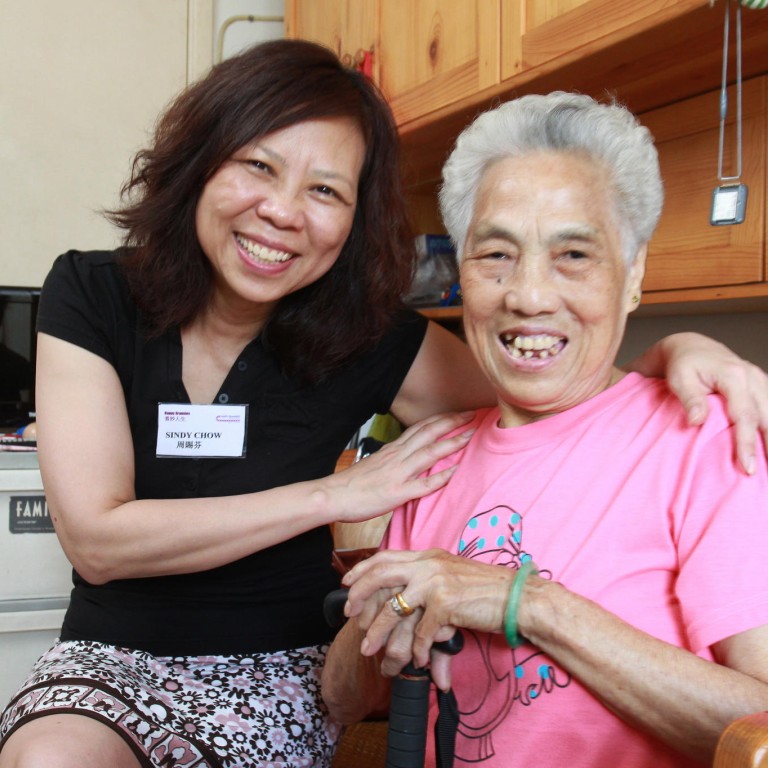
A dedicated Hong Kong worker who brings joy to her grannies
Sindy Chow set up Happy Grannies six years ago to support elderly women on the poverty line
The lock is pulled back on the door, the grill slides open and the face of the slim, erect elderly lady on the other side breaks into a grin as she recognises Sindy Chow Chi-fun of the organisation Happy Grannies.
To mark the Dragon Boat Festival, Chow has organised 13 teams of volunteers, each of which will visit two elderly women at a public housing estate in Cheung Sha Wan.
"[Local NGO] Caritas has provided us with rice dumplings for them, but since they are not really that good for them, they'll just get a small one and I'll encourage them to eat just a small bit at a time," says Chow, armed with two bags of goodies for her ladies.
The first "granny" is Cheng Tim, 84, who came to the city as a child with her father after the Japanese surrender in 1945. She began work as a nanny, then broke stones for four years and later borrowed a friend's ID card to claim she was older so that she could work in a fabric factory.
Cheng never went to school. "In those days, you just chose a piece of land on the hills and then you built your house," she says. "There were many shacks all around Kowloon City. When I got married, we couldn't afford a banquet. I just invited some people round for dinner."
I wondered why we didn’t also provide support to elderly people living alone
The Shek Kip Mei fire of 1953 led to Cheng and her husband becoming residents of the new Shek Kip Mei Estate, which was the start of Hong Kong's public housing.
Cheng touches a sensitive rib. She recently fell in the bathroom. Chow and Karin Chu Cheuk-yan, a social welfare student from Chinese University and a volunteer, get some items out of a bag including a rubber safety mat for Cheng's bathroom. Cheng also shows them her leg, where she has a skin complaint. Chow advises her to soak it in water and ginger.
"Often because they get into a repetitive lifestyle, they don't know what day it is, so they sometimes miss their medical appointments," Chow says.
Some 300,000 elderly people are on the poverty line in Hong Kong, Chow says, adding that 30,000 of them suffer from depression. Sometimes have no dependents here, or their children are too busy with work and family to have time for visits.
Chow, who lost her parents to cancer when she was young, set up Happy Grannies six years ago. "I would notice that people donated to children in Africa," she says. "But I wondered why we didn't also provide support to elderly people living alone in Hong Kong."
Happy Grannies is a programme that matches volunteers to an elderly woman, so that the partnership is more long-term, lasting at least six months. The volunteers are expected to visit an elderly partner at least once a month to build up a relationship.

Chow has been nominated for the Community Contribution Award in this year's Spirit of Hong Kong Awards organised by the .
We wave goodbye to Cheng and head off a few blocks to see Chung Yeut-yung. Her little flat is neat with her bed packed away. She shows Chow her sore neck and the volunteer administers some heat rub. Chow has also had some very high blood pressure readings. She felt dizzy and fell recently in the wet market.
Chow says Chung, 90, still has an older brother in Guangdong, who she would love to see again. Chung tells Chow she's particularly excited about this visit because she's also got a visitor from overseas. It's the first foreigner in her flat, she says.
Chow is always keen to have more volunteers who can provide a longer-term commitment. "People are generous in Hong Kong," she says, "but due to their busy lives they often prefer to give a donation rather than time."
Chow also welcomes non-Chinese-speaking volunteers. "If they can speak a bit, that's great, but we can link them up with a student translator volunteer, and it's exciting and something new for our grannies."
Chung insists on accompanying us to the lift. The bathroom mat, toothpaste and rice dumpling will come in useful, but it's the company that she's had that lights up her face.
